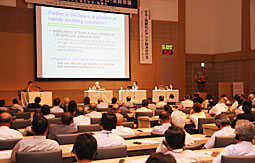 Abstract of the International Symposium (August 4, 2006)
Abstract of the International Symposium (August 4, 2006)

- Program
-
- Date
- August 4, 2006
- Location:
- Awaji Yumebutai International Conference Center, Hyogo(1 Yumebutai, Awaji-shi, Hyogo)
- Theme:
- "Falling birthrates and aging society looming in Asia"
- Details
- (1)Commemorative Lecture(13:30-14:30)
-
- "Low Fertility, Population Aging, and the Future of Asian’s Economics" Andrew Mason
Senior Fellow, East-West Center / Professor of Economics, University of Hawaii
- "Low Fertility, Population Aging, and the Future of Asian’s Economics" Andrew Mason
- (2)Discussion
- (13:45~16:30)
-
- Panelists
- Naohiro Ogawa
- Professor, Population Economics at the Advanced Research Institute for the Sciences and Humanities, Nihon University / Deputy Director, Nihon University Population Research Institute
- Angelique Chan
- Assistant Professor,Department of Sociology, National University of Singapore
- Robert D. Retherford
- Coordinator and Senior Fellow, Population and Health Studies; East-West Center
- 〔Japanese syllabary order〕
- Shigeyuki Abe(coordinator)
- Professor, Faculty of Policy Studies, Doshisha University
The Symposium began with an opening address by Mr. Satoshi Iue, Representative Director of the Asia Pacific Forum, Awaji Conference Japan, and a welcoming address by Mr. Toshizo Ido, Governor of Hyogo Prefecture. Following these two addresses, Mr. Andrew Mason, Senior Fellow of the East-West Center (USA) gave a commemorative lecture on the subject of "Low Fertility, Population Aging, and the Future of Asia's Economies."
In his commemorative lecture, Mr. Mason explained the effects on the macro-economy of the changes in the population structure of countries around the world, particularly in Asia, resulting from falling birthrates and an aging society. He also put forward specific measures that Japan and other Asian countries need to adopt in the future to ensure that the accumulated wealth of the elderly sector of the population can spur new economic growth.
In the ensuing panel discussion, which was coordinated by Mr. Shigeyuki Abe, Professor of Doshisha University Faculty of Policy Studies, there was a lively discussion from a multidisciplinary approach on the subject of "Falling birthrates and aging society looming in Asia."
Mr. Robert Retherford, Coordinator of the Population and Health program of the East-West Center (USA), referred to the problems that will face social security systems in the future as Asian society ages, noting that while there needs to be a provision of sustainable pension and health services, in many Asian countries the society will have aged by the time the country becomes wealthy.
Ms. Angelique Chan, Assistant Professor of the Department of Sociology of Singapore National University, spoke about the effects of falling birthrates and an aging society on the society and economy of Singapore. She gave specific accounts of the employment, pensions, medical expenses, and care of the elderly. She noted that it is impossible to halt the aging of society, and that there is a need to establish flexible measures that take into consideration the differences in lifestyle between generations.
Mr. Naohiro Ogawa, Professor of Nihon University Advanced Research Institute for the Sciences and Humanities, and Deputy Director of Nihon University Population Research Institute, put forward historical considerations and predictions for the future regarding the aging society in Japan. He noted that the employment of elderly people offers the possibility of relieving the problem in Japan, as the increased tax revenue from older people working will give younger people brighter employment prospects and thus reduce the interval between births, causing the birth rate to rise.
A total of approximately 200 people participated in the Symposium, with participants from five countries including the Consul General of the Netherlands in Osaka-Kobe and the Consul General of the Republic of Indonesia in Osaka.






